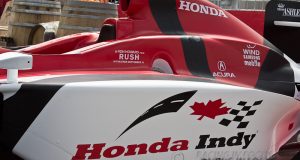Chevrolet Engine Program Reaches Design and Development Milestones
INDIANAPOLIS, May 26, 2011 – Chevrolet’s IndyCar engine program is on track for Chevy’s return to IndyCar competition in 2012. That was the message delivered today by Mark Kent, director of GM Racing, in a media briefing at Indianapolis Motor Speedway.
“The development of the Chevrolet IndyCar engine is on schedule, and we have reached all of our development plan milestones to date,” Kent said. “The research and design teams are working diligently to achieve the objectives and meet the demanding deadlines of this ambitious program.
“The initial design of the major components has been completed, and all of the components are currently in the process of being manufactured,” he said. “The first fully functional Chevrolet IndyCar engine is scheduled to fire up in June, and we plan to begin track testing the Chevy twin-turbo V-6 in the third quarter of 2011.”
Chevrolet announced on November 12, 2010, that it would produce a new twin-turbocharged, direct-injected V-6 racing engine powered by renewable E85 ethanol fuel to compete in the 2012 IZOD IndyCar Series. The new purpose-built 2.2-liter Chevy IndyCar engine is being developed jointly by GM and Ilmor Engineering.
“Chevrolet is an active participant in the development of the IndyCar engine,” Kent noted. “To enhance technology transfer, Chevrolet is incorporating components and engineering resources from its production engine component supplier base on the IndyCar engine.”
Direct injection and turbocharging are fundamental elements of the 2012 IZOD IndyCar engine package, and both are key technologies in several powerful and fuel-efficient Chevrolet production cars today. Chevrolet’s best-selling model, the new Cruze compact, and America’s favorite sports car, the Camaro, are two examples of key Chevrolet products powered with direct injection engine technology.
Direct injection introduces fuel into the combustion chamber under high pressure. As the fuel vaporizes in the cylinder, it cools the air and fuel mixture, enabling the use of a high compression ratio and improving engine performance and efficiency. Turbocharging harnesses exhaust energy to compress air into the induction system, increasing the amount of oxygen available for the combustion process and thereby enhancing power.
“Chevrolet is actively participating in the process to finalize the 2012 engine rules, and we have developed a productive working relationship with both the IndyCar Series and the other engine manufacturers,” Kent said. “One of the topics under discussion is the timetable for the introduction of brand-specific aero kits. Chevrolet fully supports the aero kit concept, and we are continuing our dialogue with IndyCar Series leadership on the aero kit introduction.”

Team Penske has committed to Chevrolet power 2012, and Chevrolet is currently in discussion with other IndyCar teams. The Chevrolet IndyCar engine will be available to other IndyCar entrants in accordance with the series’ regulations.
Chevrolet competed previously in Indy-style competition as an engine manufacturer in 1986-93 and 2002-05 with V-8 engines, winning 104 races, powering six driver champions, and scoring seven Indianapolis 500 victories.
About Chevrolet: Founded in Detroit in 1911, Chevrolet celebrates its centennial as a global automotive brand with annual sales of about 4.25 million vehicles in more than 140 countries. Chevrolet provides consumers with fuel-efficient, safe and reliable vehicles that deliver high quality, expressive design, spirited performance and value. The Chevrolet portfolio includes iconic performance cars such as Corvette and Camaro; dependable, long-lasting pickups and SUVs such as Silverado and Suburban; and award-winning passenger cars and crossovers such as Spark, Cruze, Malibu, Equinox and Traverse. Chevrolet also offers “gas-friendly to gas-free” solutions including Cruze Eco and Volt. Cruze Eco offers 42 mpg highway while Volt offers 35 miles of electric, gasoline-free driving and an additional 344 miles of extended range. Most new Chevrolet models offer OnStar safety, security and convenience technologies including OnStar Hands-Free Calling, Automatic Crash Response and Stolen Vehicle Slowdown. More information regarding Chevrolet models can be found at www.chevrolet.com.
© RIF | Chevrolet Performance and Motorsports Communications
 Racing In Focus Motorsport and Events Coverage | Racing News, Results, Photos.. from Formula 1, American Le Mans, NASCAR, IndyCar and Canadian racing
Racing In Focus Motorsport and Events Coverage | Racing News, Results, Photos.. from Formula 1, American Le Mans, NASCAR, IndyCar and Canadian racing



